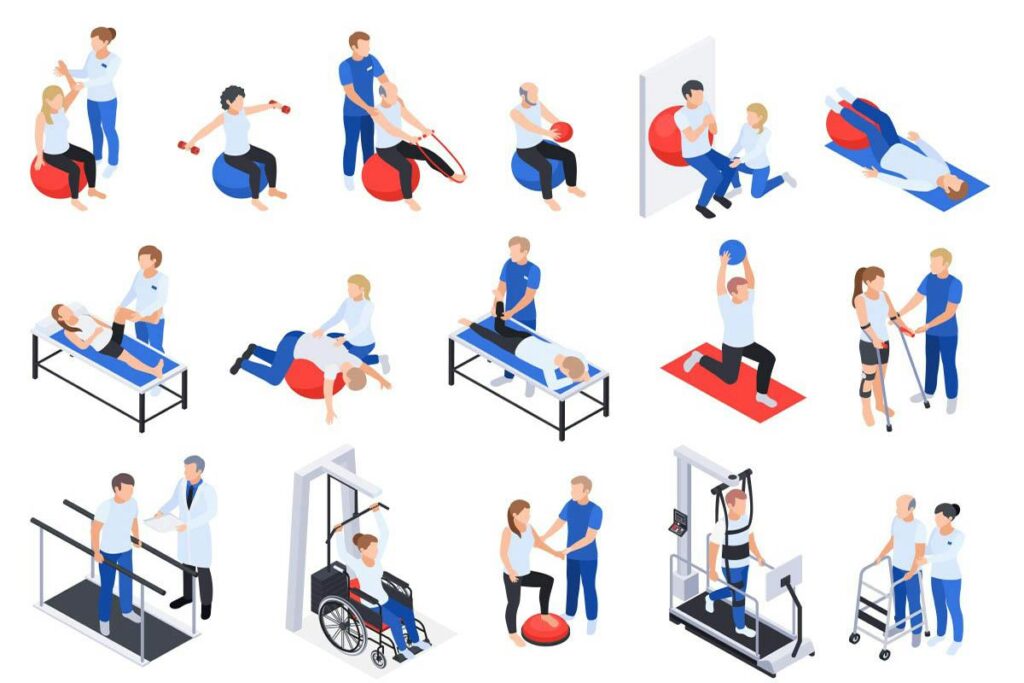Introduction
Engaging in sports and physical activities exposes athletes to various challenges, including injuries and strains. Physical therapy for athletes emerges as a crucial component in their journey to optimal performance.
In this comprehensive guide, we will dive into the definition, importance, and various aspects of physical therapy tailored specifically for athletes.
For specialized care, consider the expertise of Alliance Sports Medicine, ensuring a tailored approach to your athletic well-being.
Definition of Physical Therapy for Athletes
Physical therapy for athletes involves specialized techniques and exercises designed to enhance performance, prevent injuries, and aid in the recovery process after physical setbacks.
It goes beyond traditional rehabilitation, focusing on athletes’ unique needs and demands.
The Importance of Physical Therapy for Athletes

Athletes subject their bodies to intense physical stress, making them prone to injuries and muscle imbalances. Recognizing the significance of physical therapy, not just as a remedy but as a proactive strategy, is crucial for their sustained success and well-being.
Injury Prevention: Athletes frequently expose their bodies to intense physical stress, increasing the risk of injuries. Physical therapy employs preventive measures, identifying and addressing potential issues before they escalate.
Muscle Balance and Health: Intensive training can lead to muscle imbalances, affecting an athlete’s performance. Physical therapy focuses on restoring and maintaining muscle balance, promoting overall musculoskeletal health.
Proactive Longevity Approach: Physical therapy is a proactive approach that contributes to the longevity of an athlete’s career. Regular sessions help identify weaknesses, enhance performance, and ensure sustained well-being throughout an athlete’sathlete’s career.
The Role of Physical Therapy for Athletes

Rehabilitation
Restoring Athletes After Injuries
- A physical therapist use rehabilitative exercise and cardiovascular conditioning to restore athletes’athletes’ injured tissue to normal or near-normal function.
- Therapists employ targeted techniques to accelerate healing to facilitate the recovery of athletes after injuries, reduce inflammation, and restore optimal function.
Customized Recovery Plans
- Each athlete is unique, and so are their injuries. Physical therapists craft personalized recovery plans, considering the nature of the injury, the athlete’s sport, and their overall health to ensure a more effective and efficient rehabilitation process.
Improving Mobility
Techniques to Enhance Athletes’Athletes’ Range of Motion
- Physical exercise therapy significantly improves mobility.
- Physical therapists explore a variety of techniques, including mobilization for the joint and soft tissue manipulation, to enhance an athlete’s range of motion, promoting agility and reducing the risk of injuries.
Tailored Exercises for Specific Sports
- Understanding the specific movements required in different sports, therapists design exercises that mimic and enhance those actions.
- This sport-specific approach not only improves mobility but also contributes to skill refinement.
Enhancing Flexibility
The Importance of Flexibility in Athletic Performance
- Physical therapy emphasizes the significance of maintaining and improving flexibility, contributing to better agility, balance, and overall athletic prowess.
Stretching Routines and Their Impact
- Therapists incorporate targeted stretching routines that address the unique needs of athletes and not only enhance flexibility but also aid in muscle recovery and injury prevention.
Pain Management
Addressing and Reducing Pain in Athletes
- Athletes often deal with chronic pain due to repetitive motions and intense training. Physical therapy plays a crucial role in minimizing injuries and pain for athletes.
- Physical therapists employ strategies to identify and address the root causes of pain, promoting long-term relief.
Non-Invasive Methods for Pain Relief
- Physical therapy emphasizes non-invasive methods such as manual therapy, acupuncture, and therapeutic exercises to manage and alleviate pain, minimizing the reliance on medications.
Building Strength
Strength Training as a Core Component
- Physical therapists incorporate strength training programs that focus on muscle groups relevant to the athlete’s sport, improving overall performance.
Tailored Strength Programs for Athletes
- Recognizing that different sports demand different types of strength, therapists design customized strength programs that align with each athlete’s specific needs and requirements.
Alliance Regen and Rehab: HELPING YOU GET BACK TO YOUR SPORT WITH IMPROVED PERFORMANCE

At Alliance Regen and Rehab, we understand the unique demands athletes face. Our team of dedicated physical therapists is committed to providing personalized care that facilitates recovery and enhances athletic performance. Trust us to be your partner in achieving your athletic goals.
FAQs
Q1: How often should athletes undergo physical therapy?
A1: The frequency of athlete therapy sessions varies based on individual needs, sport type, and existing injuries. It is a personalized decision, considering factors like the athlete’s recovery capacity, the demands of their sport, and the presence of injuries.
Communication with healthcare professionals guides the optimal frequency, ensuring a tailored approach for effective recovery and performance enhancement.
Q2: Is physical therapy only for injured athletes?
A2: No, physical therapy is beneficial for both injured and uninjured athletes. It serves a dual purpose, acting as athletic performance therapy by preventing injuries, enhancing performance, and supporting overall well-being.
Physical therapy is not limited to injury recovery; it plays a crucial role in optimizing athletic performance. Whether addressing existing injuries or proactively enhancing an athlete’s capabilities, physical therapy, often referred to as muscular performance therapy, contributes to a comprehensive approach to health, performance, and longevity in sports.
Q3: How long does it take to see results from physical therapy?
A3: The timeline for results in physical therapy depends on the nature and severity of the condition, especially in the context of mobility athletes. Consistent attendance and adherence to home exercises are crucial for optimal outcomes.
Conclusion
In conclusion, physical therapy for athletes is not just about recovering from injuries; it’s a proactive and personalized approach to optimizing performance and ensuring longevity in sports.
Whether you’re you’re recovering from an injury or aiming to prevent one, incorporating Sports rehab in St Petersburg FL, into your athletic journey is a strategic investment in your well-being and success.


